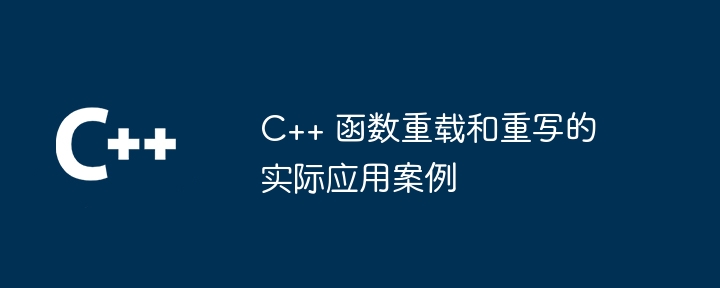

Practical application cases of C function overloading and rewriting
Function overloading
Function overloading allows the same function name to have different implementations to handle different types or numbers of arguments. For example, we can create a function that prints different types of data: Functions with the same name and parameter types have different implementations. For example, we have a base class
Shapewhich defines a function to calculate the area:
void print(int value) { cout << value << endl; } void print(double value) { cout << value << endl; } int main() { int num = 10; double number = 12.5; print(num); // 调用 print(int) print(number); // 调用 print(double) return 0; }
andCircleoverride
function and provides its own implementation:class Shape { public: virtual double getArea() = 0; // 虚拟函数声明 };Practical CaseConsider the following example, which uses function overloading and function overriding to Create a program that calculates the area of a shape:
class Rectangle: public Shape { public: double width, height; Rectangle(double width, double height) : width(width), height(height) {} double getArea() override { return width * height; } }; class Circle: public Shape { public: double radius; Circle(double radius) : radius(radius) {} double getArea() override { return 3.14 * radius * radius; } };
In this case, theShapeclass defines a virtual
getAreafunction, subclassed by
RectangleandCircleoverrides. TheprintAreafunction uses function overloading to handle different types ofShapeobjects and print their areas.
The above is the detailed content of Practical application cases of C++ function overloading and rewriting. For more information, please follow other related articles on the PHP Chinese website!
 What are the differences between c++ and c language
What are the differences between c++ and c language Recommended learning order for c++ and python
Recommended learning order for c++ and python Cost-effectiveness analysis of learning python and c++
Cost-effectiveness analysis of learning python and c++ Is c language the same as c++?
Is c language the same as c++? Which is better to learn first, c language or c++?
Which is better to learn first, c language or c++? The difference and connection between c language and c++
The difference and connection between c language and c++ C++ software Chinese change tutorial
C++ software Chinese change tutorial Cost-effectiveness analysis of learning python, java and c++
Cost-effectiveness analysis of learning python, java and c++



